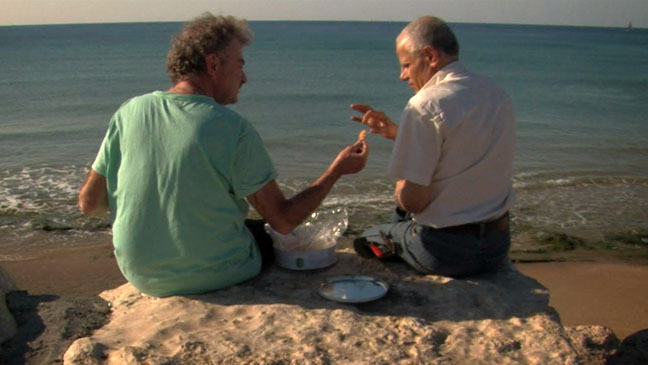
13 November 2013 19:30, Flagey Brussels.
Talk with Avi Mograbi proceeded by a screening of his latest film.
Once I Entered a Garden
FR/IL/CH, digital video, color, Hebrew & Arab spoken, English subtitles, 2012, 97’
“Quand vous faites du documentaire, vous devez accepter que la réalité influe en tant que réalité. Cela signifie: accepter d’être surpris, avoir son propre input, ne pas imposer ses propres idées sur la réalité même si on impose ses choix. Je ne prétends pas être un reflet de la réalité, c’est un reflet de ma façon dont la réalité doit être montrée. La question centrale, c’est celle de intégrité.”
– Avi Mograbi
“Once I entered a garden to smell the scent of the flowers, and distract my sad soul.” So begins the song that gave Avi Mograbi’s latest film its title. Crooned by the Syrian singer Asmahan, it tells the story of a love that has withered, of hearts that have been violently broken with little hope of mending. The garden in the title turns out to be not a promised land of dreams, but a forbidden garden with no room left for the other. It is this irresolvable tension between dream and reality, hope and impossibility, that lies at the very heart of the film; a tension that goes to the core of the enduring conflict between Israel and Palestine, the issue Mograbi’s work has been fervently dealing with for over two decades. But in contrast to his previous films, here he does not start out from a situation of opposition and antagonism, but one of participation and complicity; and the search that drives him and his companion is not one for agitation or revelation but rather for consolation. A whisper, rather than a cry. As is true of all memorable journeys, its path was not the one initially chosen. In wanting to make a film about some of his family members who used to openly cross the border between Israel and Lebanon, Mograbi calls upon his friend Ali Al-Azhari, a Palestinian who has been living most of his adult life in Tel-Aviv. As their partnership develops, the family tale of crossing borders makes way for a story about crossing identities: between “me” and “we”, “us” en “them”, Arab and Israeli. The bittersweet account of “sad souls” seeking refuge – at one point quite literary – in a forbidden garden prompts a surge of hope, as a bilingual dialogue on a history in common leaves us pondering the possibility of a common future. Perhaps that is what makes this, as Mograbi himself has argued, his most radical film yet: one proposing, like all tender tales of love and friendship, an experience of a world lived through the perspective of difference, rather than identity.
DISSENT ! is an initiative of Argos, Auguste Orts and Courtisane, in the framework of the research project “Figures of Dissent” (KASK/Hogent), with support of VG & VGC. The visit of Avi Mograbi was initiated by KASK/Hogent.
As part of a Avi Mograbi programme, Flagey will also be showing Z32 (2008) and Avenge but one of my two eyes (2005).
——————————————————————————————————————————————————————-
About DISSENT!
How can the relation between cinema and politics be thought today? Between a cinema of politics and a politics of cinema, between politics as subject and as practice, between form and content? From Vertov’s cinematographic communism to the Dardenne brothers’ social realism, from Straub-Huillet’s Brechtian dialectics to the aesthetic-emancipatory figures of Pedro Costa, from Guy Debord’s radical anti-cinema to the mainstream pamphlets of Oliver Stone, the quest for cinematographic representations of political resistance has taken many different forms and strategies over the course of a century. The multiple choices and pathways that have gradually been adopted, constantly clash with the relationship between theory and practice, representation and action, awareness and mobilization, experience and change. Is cinema today regaining some of its old forces and promises? Are we once again confronted with the questions that Serge Daney asked a few decades ago? As the French film critic wrote: “How can political statements be presented cinematographically? And how can they be made positive?”. These issues are central in a series of conversations in which contemporary perspectives on the relationship between cinema and politics are explored.